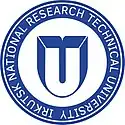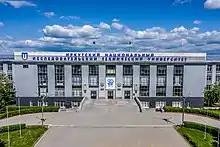Irkutsk National Research Technical University
National Research Irkutsk State Technical University (full name in Russian: Иркутский национальный исследовательский технический университет), formerly Irkutsk State Technical University, is a technical university in Russia.
Иркутский национальный исследовательский технический университет | |
 | |
| Motto | Знания - для себя, достижения - для Отечества |
|---|---|
Motto in English | Knowledge for yourself, achievements for homeland |
| Type | Public |
| Established | 1 January 1930 |
| Rector | Kornyakov Michael Victorovich |
Academic staff | 980 |
| Students | 18451 |
| Location | , 52°15′46″N 104°15′43″E |
| Campus | Urban |
| Language | Russian |
| Website | eng |
| University rankings | |
|---|---|
| Global – Overall | |
| THE World | 1201–1500 (2022) |
| Regional – Overall | |
| QS Emerging Europe and Central Asia[1] | 301-350 (2022) |
| National – Overall | |
| Forbes National[2] | 57 (2022) |
| Interfax National[3] | 47 (2022) |

History
The Specialized Secondary School Irkutsk Mining College was established in 1893, with the principal objective to train mill-diggers for the needs of mining business, and in particular the gold-mining industry.
In 1918 the school was transformed into a Secondary Mining College, and in 1920 it was renamed the Irkutsk Polytechnic College. But the technical school was soon reorganised into the Irkutsk Polytechnic Practical Institute (IrPolPrIn). In August 1923 Irpolprin was reorganized into East Siberian Polytechnic College of regional importance, and later formed the foundation of the Siberian Mining Institute in Irkutsk. The Mining Institute was housed at 3, Lenin Street. S.V. Sergeev, head of the Geological Survey Department of the Soyuzdoloto Board was appointed as its first director; Professor G.V. Kliuchanskiy was appointed as his deputy for educational and scientific work.
Around that time, the Faculty of Workers (rabfak) was opened.
On March 19, 1960, the Mining and Metallurgical Institute was renamed to Polytechnic Institute. It received its designation as a university in 1994 and received its Certificate of Attestation of Educational Institution in 1997 and state accreditation in 1998.
Its scientists made a significant contribution to the economy of the Irkutsk region, East Siberian region, the CIS countries.
On 20 May 2010, IrSTU was named a "National Research University" and approved the program of scientific development in these areas:
- Highly efficient subsoil technologies
- Science-intensive, high-efficiency machinery and equipment manufacturing technologies
- Science intensive life support systems for urban and sparsely populated areas
- Industry of nanosystems and nanomaterials
INRTU structure
Schools
- Siberian School of Geosciences [4]
- Baikal School of BRICS [5]
- School of Aircraft Construction, Mechanical Engineering and Transport [6]
- School of Architecture, Construction and Design [7]
- School of High Technologies [8]
- School of Extramural and Evening Education <[9]
- School of Information Technology and Data Science [10]
- School of Quantum Physics [11]
- School of Linguistics and Intercultural Communication [12]
- School of Subsurface Resource Management [13]
- School of Economics, Management and Law [14]
- School of Power Engineering [15]
Divisions
- Branch School in Usolye-Sibirskoye
- Department of Secondary Vocational Education:
- College of Mechanical Engineering
- Geological Exploration Technical School
- Department of Educational and Production Work
- Professional Internship facilities in Slyudyanka
Scientific and educational centers and institutions within the university
- INRTU Center for Fundamental Research
- Baikal Nanotechnology Center
- Science Library
- Museum of INRTU history
- The Museum of Mineralogy is the largest mineralogical museum beyond the Urals
- Museum of Military Glory
- Museum of the History of Computing
English and Russian-Taught Programs
In 2017, an entirely new school was established within INRTU - Baikal School of BRICS - the only one of its kind in Russia. It is INRTU educational greenfield, where all courses are taught by leading Russian and foreign professors in English.
By October 2021, Baikal School of BRICS has hosted 576 Russian and international students from 15 countries and employed 10 foreign professors and researchers and 39 Russian.
At the beginning of 2021, 1,200 foreign students from 56 countries were studying at INRTU. Students have opportunity to choose degree courses taught in English or Russian, dual degree programs, as well as courses in Russian as a Foreign Language.
INRTU offers English-taught programs in the following majors
Bachelor's degree:
- Artificial Intelligence and Computer Science
- Environmental Science Engineering
- Finance and Accounting
- Sustainable Innovative Economics
- Power Electrical Engineering
- International Business
- Journalism and Media Communication
- Technical Operation of Aviation Equipment
- Business Intelligence and Digital Marketing
- Linguistics and Business Communications
master's degree:
Infrastructure and campus
The university campus has 19 dormitories with a total of 4,000 beds.
International rankings
2022
- 1201-1500 Times Higher Education (World University Rankings 2023)
- 301-400 Times Higher Education (University Impact Ranking)
- 1001+ Times Higher Education (by subject: engineering)
- 301-350 QS (Emerging Europe and Central Asia Rating)
- 351-400 QS (BRICS University Rankings)
- 204 – UI Green Metrics (World University Ranking)
- 57 – Forbes Top 100 Russian university
- 47 – Interfax national ranking
2021
- 301-350 QS (Emerging Europe and Central Asia Rating)
- 351-400 QS (BRICS University Rankings)
- 401-600 Times Higher Education (University Impact Ranking)
- 225 – UI Green Metrics (World University Ranking)
- 63 – Forbes Top 100 Russian university
- 32 – Interfax national ranking
2020
- 251-300 QS (Emerging Europe and Central Asia Rating)
- 351-400 QS (BRICS University Rankings)
- 601+ Times Higher Education (University Impact Ranking)
- 389 – UI Green Metrics (World University Ranking)
- 77 – Forbes Top 100 Russian university
- 29 – Interfax national ranking
2019
- 351-400 QS (BRICS University Rankings)
- 301+ Times Higher Education (University Impact Ranking)
- 540 – UI Green Metrics (World University Ranking)
- 34 – Interfax national ranking
Priority 2030
In 2022, INRTU was one of 106 Russian universities who participated in the Strategic Academic Leadership Program.
INRTU is implementing two strategic projects within this Program - i.GeoDesign and Digital Industrial Technologies.
i.GeoDesign aims to change the principles of mining and geological industry formation through the university developments in smart digital geology, usage of drones in exploration, and the university new role in shaping junior business. The second project of Digital Industrial Technologies is associated with the development of advanced manufacturing technologies and raising high-skilled specialists for the Russian industry in the fields of aircraft, energy and construction.
Innovation
Irkutsk National Research Technical University is the leader of the Irkutsk region in innovation sphere. In 2017, the university received the status of a Regional Center of Technological Development. Every year INRTU generates more than 60 innovative projects.
The INRTU Technopark was opened in 2010. It became the first scientific and technological complex in Irkutsk region. The total area of the INRTU Technopark is 5260 sq. m. It includes research laboratories, modern teaching, production and corporate research centers, a business incubator, and a large conference room. The INRTU Technopark residents are 41 high-tech companies, which in 2020 carried out assignments for more than 800 million rubles. Various innovative infrastructure projects are successfully implemented at INRTU Technopark: student business accelerator, startup school for innovators "Taiga", startup school "Taiga. Junior", Irkutsk school of innovation managers and others.
International Partnerships
INRTU productively cooperates with 111 partners from 25 countries in Europe and Asia; has 138 agreements on cooperation, including 9 double degree programs with partner universities. Click the icon to learn more about the university and the program it offers.
Double degree and exchange programs are implemented in cooperation with more than 20 countries among which are Mongolia, China, Kazakhstan, Belarus, Republic of Korea and many others.
INRTU is a member of several international organizations:
References
- "QS World University Rankings-Emerging Europe & Central Asia". Retrieved 15 January 2023.
- "Forbes University Rankings Russia". Retrieved 15 January 2023.
- "Interfax University Rankings". Retrieved 15 January 2023.
- "Siberian school of geosciences". eng.istu.edu. Retrieved 2022-07-29.
- "Baikal School of BRICS". eng.istu.edu. Retrieved 2022-07-29.
- "School of Aircraft Construction, Mechanical Engineering and Transport". eng.istu.edu. Retrieved 2022-07-29.
- "School of Architecture, Construction and Design". eng.istu.edu. Retrieved 2022-07-29.
- "School of High Technologies". eng.istu.edu. Retrieved 2022-07-29.
- "School of Information Technology and Data Science". www.istu.edu. Retrieved 2022-07-29.
- "School of Information Technology and Data Science". eng.istu.edu. Retrieved 2022-07-29.
- "School of Quantum Physics". eng.istu.edu. Retrieved 2022-07-29.
- "School of Linguistics and Intercultural Communication". eng.istu.edu. Retrieved 2022-07-29.
- "School of Subsurface Resource Management". eng.istu.edu. Retrieved 2022-07-29.
- "School of Economics, Management and Law". eng.istu.edu. Retrieved 2022-07-29.
- "School of Power Engineering". eng.istu.edu. Retrieved 2022-07-29.
- "Association of Sino-Russian Technical Universities". asrtu.cn. Retrieved 2022-07-29.
- "Romualdo del Bianco Foundation". fondazione-delbianco.org/. Retrieved 2022-07-29.
- "Silkroad University Network". sun-silkroadia.org. Retrieved 2022-07-29.